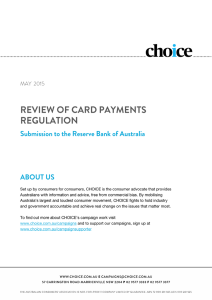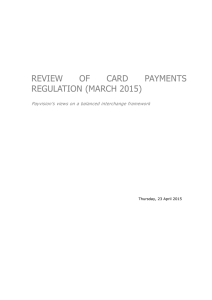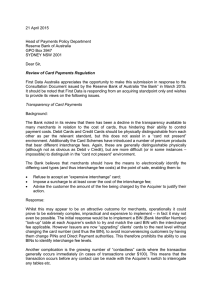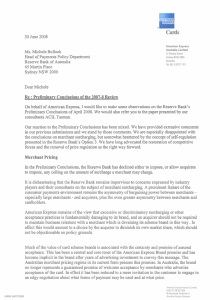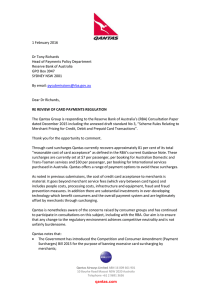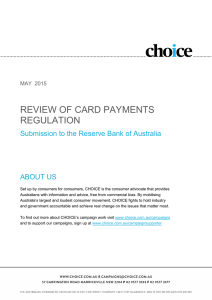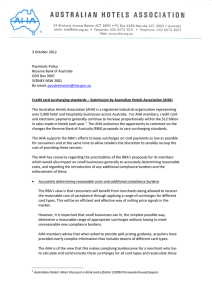Document 10842486
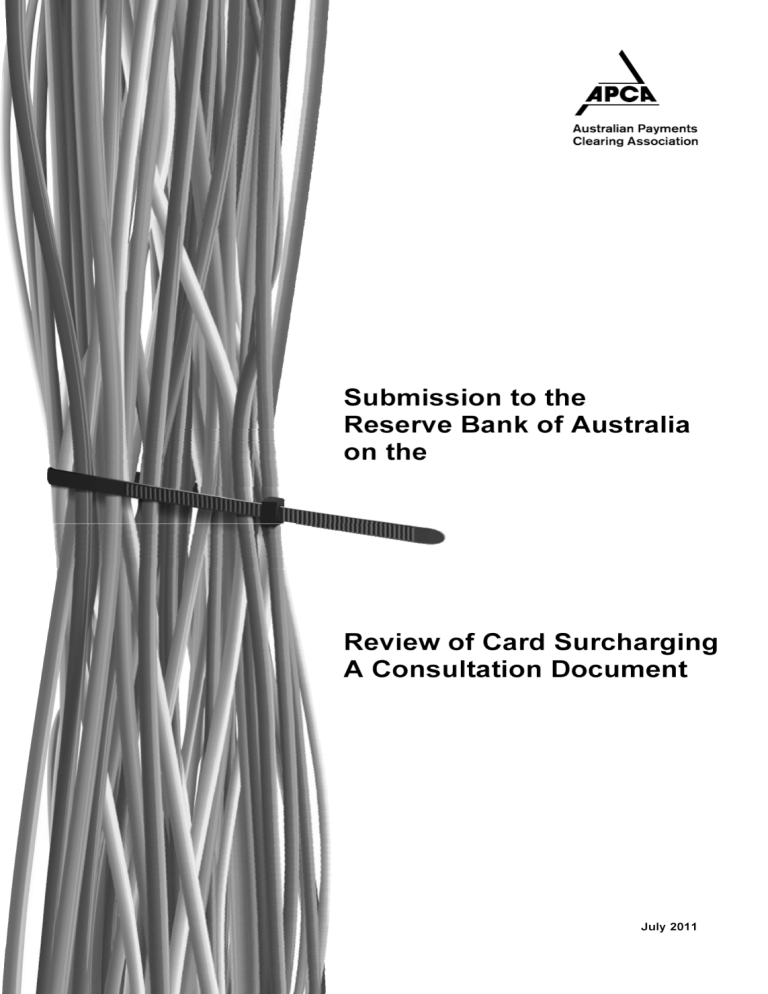
Addressing Excessive Merchant Surcharging on Payment Cards Submission to RBA
About this document
This is the submission of the Australian Payments Clearing Association to the Reserve
Bank of Australia on the Review of Card Surcharging: A Consultation Document, issued in
June 2011.
Contact:
Dr Brad Pragnell
Head of Industry Policy
Australian Payments Clearing Association Limited
Email: bpragnell@apca.com.au
Level 6, 14 Martin Place
Sydney NSW 2000
Tel: +61 2 9221 8944
Fax: +61 2 9221 8057
Publication
The Association has no objection to publication of its submission.
Information in this document is subject to change without notice.
No part of it may be copied, reproduced, translated, or reduced to any electronic medium or machine-readable form without prior written permission from Australian Payments Clearing
Association Limited.
Written and published in Sydney, Australia by Australian Payments Clearing Association Limited.
Copyright
©
2011 Australian Payments Clearing Association Limited
ABN 12 055 136 519.
All Rights Reserved.
July 2011 ii
Addressing Excessive Merchant Surcharging on Payment Cards Submission to RBA
Table of Contents
Executive Summary............................................................................. 1
Market-Based Policy for Payments Efficiency .................................. 1
The Case for Modifying the “No Surcharge” Standard .................... 2
The appropriateness of capping surcharges .................................... 4
Monitoring and enforcement .............................................................. 5
Enhanced Disclosure and Data Collection ........................................ 6
July 2011 iii
Addressing Excessive Merchant Surcharging on Payment Cards Submission to RBA
The Australian Payments Clearing Association Limited is pleased to make this submission to the
Reserve Bank of Australia’s Review of Card Surcharging.
Merchant surcharging has been one element of an overall package of changes within the card payments system. Throughout the RBA’s card system reform process, APCA has noted the need for reforms to promote competition to drive efficiency within the payments system. APCA continues to believe that the promotion of competition remains the best way to promote innovation and efficiency within card payments.
Curtailing of merchant surcharging in excess of card acceptance costs appears relevant to payment system efficiency and we support the RBA exploring the issue. Ideally the regulator should be making the market more efficient. Restricting pro-market reforms should not be made lightly and price capping is often a “last resort” when other measures, such as enhancing competition, have failed. The regulation of merchant surcharging would represent a move away from finding market-based solutions for payments policy issues.
We acknowledge the desirability of addressing excessive surcharging. In doing so, the RBA must make the case for regulatory intervention and ensure the benefits of intervention outweigh the costs. The RBA must be aware of possible unintended consequences associated with the regulation of merchant surcharging.
In making any changes to the regulation of merchant surcharging, the RBA will need to be certain :
1) their regulatory intervention is primarily premised on the policy objective of improving payments system efficiency (as opposed to consumer protection which would suggest the involvement of other regulators);
2) that the capping of merchant surcharging is the only feasible response to concerns over
“excessive surcharging”; and,
3) that “deputising“ the card schemes and acquirers to monitor and enforce merchant surcharging standards is appropriate in the circumstances.
2. Market-Based Policy for Payments Efficiency
APCA submits that fixing or capping prices, be it interchange fees or merchant surcharges, has the effect of limiting competition in payment instrument markets. It does so by artificially fixing the differential cost between payment system participants.
This can affect the commercial arrangements between participants and distort the price signals to consumers, potentially resulting in sub-optimal outcomes.
July 2011 1
Addressing Excessive Merchant Surcharging on Payment Cards Submission to RBA
Price fixing or capping should ordinarily be the last resort in micro-economic regulation and only considered once more pro-market responses have been properly explored.
Further, merchant surcharging is a complex issue as it lies at the intersection of payments system efficiency and consumer protection issues, areas that operate under different regulatory frameworks in Australia. Any intervention by the RBA on merchant surcharging should be demonstrably premised on achieving payment system efficiency.
The RBA may find some use in seeking advice on the applicability of existing provisions within
Australian Consumer Law (such as the single pricing provisions with the Competition and
Consumer Act ) to address excessive surcharging. If these provisions are found to be applicable and pricing and consumer protection issues emerge as fundamental aspects of the policy solution to excessive surcharging, then the involvement of regulators such as the Australian Competition and Consumer Commission (ACCC) and the Australian Securities and Investments Commission
(ASIC), in helping to develop the solution is likely warranted.
3. The Case for Modifying the “No Surcharge” Standard
Between 2003 and 2007, the RBA imposed standards that required the removal of the “nosurcharge” rules of the major credit and debit card schemes in Australia. This enabled merchants in Australia to surcharge customers for the use of credit or debit cards.
The practice of merchant surcharging has not been subject to specific regulation, though the
ACCC and ASIC jointly produced a guide for merchants on appropriate surcharging practice within the remit of general consumer protection legislation. The introduction of a merchant surcharging cap would represent a new regulatory intervention affecting hundreds of thousands of Australian businesses.
As noted in the Consultation Paper, the East and Partners research suggests that adoption of surcharging by merchants has accelerated in recent years. According to this research, about 30 per cent of merchants currently impose a surcharge on at least one credit card.
Enabling merchants to surcharge was designed to achieve a number of policy outcomes including: i) placing downward pressure on Merchant Service Fees (MSFs); ii) creating pricing signals for cardholders that would distinguish between payment channels; and iii) allowing merchants to pass on card acceptance costs.
The policy appears to have broadly met these outcomes, though the consultation paper suggests that the appropriate passing on of merchant costs through surcharging requires attention.
The introduction of merchant surcharging has coincided with a decline in MSFs. The average
MSFs for MasterCard and VISA credit cards have declined from 1.4 to 0.8 per cent between 2003 and 2011, a 40 per cent decline. This decline of MSFs, one of the intended policy objectives of
July 2011 2
Addressing Excessive Merchant Surcharging on Payment Cards Submission to RBA merchant surcharging, has also contributed to the increasing gap between average surcharges levels and average MSFs identified in the consultation paper.
Merchant surcharging has also created certain pricing signals for specific payment alternatives that were previously absent. The RBA’s 2010 Consumer Payments Use Study strongly suggests, despite a significant rise in merchant surcharging, cardholders have been able to make active decisions about card usage. The Study notes that “the proportion of transactions on which a surcharge is paid remained largely steady over the same period (between 2007 and 2010), suggesting that consumers have become more sensitive to surcharges or better at avoiding them.”
Credit card usage in Australia has moderated significantly over the past few years, alongside a strong shift towards debit cards. The number of weekly MasterCard/Visa credit card transactions has declined from 1.4 per person to 1.2 per person, while eftpos has increased from 1.5 to 2.1 per person per week and scheme debit from 0.5 to 1.3 per person per week in the same period.
While multiple factors are at work in this shift from credit to debit cards, the consumer response to surcharging is likely a factor.
Despite the rise of card surcharging, to the best of our knowledge, surcharging of other payment instruments remains almost non-existent. We believe that this is due to the RBA interventions on the lifting of the “no surcharge” standards sending a signal to merchants that card surcharging was acceptable. Indeed, former RBA Governor Ian Macfarlane is quoted as saying “we think
(merchants) are acting in the national interest when they (surcharge)”.
The absence of clear regulatory signals on the acceptability of surcharging other payment instruments has likely meant merchants have been hesitant to explore this path. Recent attempts by major utilities to impose surcharges on cash and cheque payments have been left exposed to public and political criticism. In some instances, the practices have been withdrawn after introduction. This on-going uncertainty effectively constrains the ability of merchants to recoup costs associated with non-card payments, potentially creating cross-subsidies (card users subsidising cash and cheque users) or else disposing merchants to promote cards, on which they can surcharge, at the expense of other options (which may contribute to the dominance of cardcentric options amongst online merchants). An unintended consequence of card surcharging is that drives consumers to cash, which is often costly and inefficient. Given the RBA’s objective for payments efficiency, there should be clarity on the ability of merchants to surcharge both card and
1
John Bagnall, Sophia Chong and Kylie Smith (2011) Strategic Review of Innovation in the Payments System: Results of the Reserve
Bank of Australia’s 2010 Consumer Payments Use Study, June 2011, p. 31.
2
Op cit, p. 11.
3
Choice Report, Credit Card Surcharging in Australia , Prepared on Behalf of NSW Fair Trading, p.7.
July 2011 3
Addressing Excessive Merchant Surcharging on Payment Cards Submission to RBA non-card payment instruments to recoup acceptance costs and to effect more robust payment instrument competition.
4. The appropriateness of capping surcharges
Merchant surcharging appears to have met its policy objectives, through creating price signals. It has also coincided with downward movement in MSFs. Further, merchant surcharging has enabled merchants to pass on their card acceptance costs. However the absence of controls on surcharging appears to have led to “excessive surcharging”, where surcharges are higher than the costs of card acceptance. Excessive surcharging is a concern, as it distorts price signals and adversely impacts on payments system efficiency.
The consultation paper identifies the growing gap between the average MSF and average surcharges as evidence of excessive surcharging, as well as citing anecdotal evidence of higher than expected surcharges.
This data suggests excessive surcharging is an issue requiring further attention. However this data fails to fully capture the breadth and depth of excessive surcharging and further information will be needed from merchants to determine the extent of the problem and the best policy response. More granular cost information from merchants, particularly from those industries identified as engaging in excessive surcharging, may assist the RBA to determine the actual extent of excessive surcharging and to refine the regulatory response accordingly.
The RBA should also take into account the impact of factors outside of the payments system, such as the relative competitiveness of certain retail markets, in determining the nature of the problem and the most appropriate policy solutions. The existence of excessive merchant surcharging suggests that some merchants have pricing power. This challenges the notion that merchants are entirely passive in their ability to accept specific payment instruments.
As noted above, APCA is of the view that price capping should be avoided as it can distort markets and create inefficient outcomes. Self-regulatory or market-based solutions, such as industry compacts or codes, might be explored to similarly prevent excessive surcharging. As well, the application of existing regulatory provisions in consumer protection legislation may achieve the desired policy outcome without imposing a new regulatory framework
Further, the consultation paper suggests two types of caps; Option 1 which would be a fixed cap and Option 2 which would be a more flexible cap based on reasonable merchant acceptance costs.
Fixed caps, as proposed in Option 1, have many problems. They send distorted signals to consumers and will always be “too high” or “too low”. Many merchants with lower costs may set their surcharge at the maximum rate while continuing to recover costs not related to card acceptance costs. This would enable excessive surcharging to legitimately continue. Indeed, a cap may generate comfort amongst merchants on surcharging and lead to a situation where the majority of merchants apply the surcharge up to the cap. Alternatively, a fixed cap may require
July 2011 4
Addressing Excessive Merchant Surcharging on Payment Cards Submission to RBA merchants with higher costs to split their card acceptance costs between the surcharge and the price, effectively distorting the price signals.
Fixed caps also mean that the regulatory resources will be consumed in establishing the cap as well as dealing with the continual lobbying that will follow to have the cap made higher or lower.
Option 2 would relate the surcharge cap to the merchant’s card acceptance costs. While more flexible for merchants, it could be a major compliance burden on merchants (who may need to collect and correctly apportion those costs) as well as acquirers (who may need to monitor surcharging by their merchants, a practice not all acquirers currently do).
Even if we accept that excessive merchant surcharging exists and that it is impacting negatively on payments efficiency, then capping of surcharging as a solution should remain an economic regulator’s “last resort”.
5. Monitoring and enforcement
In seeking a regulatory response to excessive surcharging, the RBA admits “the Bank has no direct influence over merchant pricing” and goes on to suggest that the existing no surcharge standards be amended to permit merchant surcharging to be capped through changes in scheme rules.
In practice, this deputises the international card schemes and their acquirers to carry out a quasiregulatory role of monitoring and policing merchant surcharging practices. Given the card schemes historical role in restricting merchants surcharging and the apparent absence of relevant
RBA powers, this appears to be a pragmatic response.
However, this also raises questions as to whether this is the most appropriate solution. If the RBA focuses on what is within its mandate, namely payment system efficiency, then it should have, or be given, the power to achieve this objective.
If the RBA is seeking to protect consumers, then it is probably not surprising that its powers are inadequate.
As previously noted, the admission by the RBA that it lacks the power raises other issues, such as whether the involvement from another public sector regulator, such as the ACCC or ASIC is warranted. The RBA should also explore whether excessive surcharging could be addressed, even partially, through existing consumer protection provisions on pricing.
In seeking to deputise the schemes and acquirers to monitor and potentially enforce surcharge caps, it is unclear what the RBA’s expectations will be on those parties.
Dependent on the RBA’s expectations, there is a strong possibility that monitoring and enforcement of any new merchant surcharging rules may impose additional costs, particularly on acquirers. Any such costs must be kept to an absolute minimum.
July 2011 5
Addressing Excessive Merchant Surcharging on Payment Cards Submission to RBA
Some merchants have blended surcharges, which combine the acceptance costs of various card schemes into a single rate. This is criticised as “overpricing” cheaper payment options and
“underpricing” expensive payment options.
In principle, merchants should be encouraged to relate their surcharging to the marginal acceptance costs of a particular payment option. That said, overly prescribing how a merchant should set the surcharge will likely have unintended consequences including dampening competition, restricting innovation and choice at the shop counter, as well as greater compliance costs on merchants and acquirers. The discussion in the consultation paper about the cost base for surcharging itself highlights that we do not have the data to review whether MSFs are the major cost drivers, nor whether the cost base varies greatly across different categories of merchants.
7. Enhanced Disclosure and Data Collection
We would strongly object to a requirement that merchants disclose their MSF to consumers. This is a fundamental intrusion into commercial confidentiality for acquirers and potentially damaging to their commercial affairs. It is likely to have unintended consequences for the market in merchant acquiring services, potentially dampening competition in that market.
As the RBA develops its response to excessive surcharging, better information from merchants on their card acceptance costs is likely an important part of the developing an appropriate policy response.
8. Conclusion
APCA agrees with the RBA that, in the main, the merchant surcharging reforms have been successful in their objectives of setting of price signals. Surcharging has also coincided with downward trending of MSFs. APCA further agrees that excessive surcharging is a matter requiring further examination.
However, APCA believes that market and self-regulatory based solutions or existing legislation should be explored before any consideration of a new price capping response to address excessive surcharging. APCA strongly believes price capping of merchant surcharging and interchange fees distort markets and inhibit efficient outcomes.
APCA also believes that the RBA should explore regulatory options beyond enabling the card schemes to introduce new rules. In developing a regulatory response, the RBA must be mindful of the compliance costs on both merchants and acquirers.
APCA welcomes a further dialogue with the RBA and industry stakeholders to identify solutions to this challenging area.
July 2011 6
